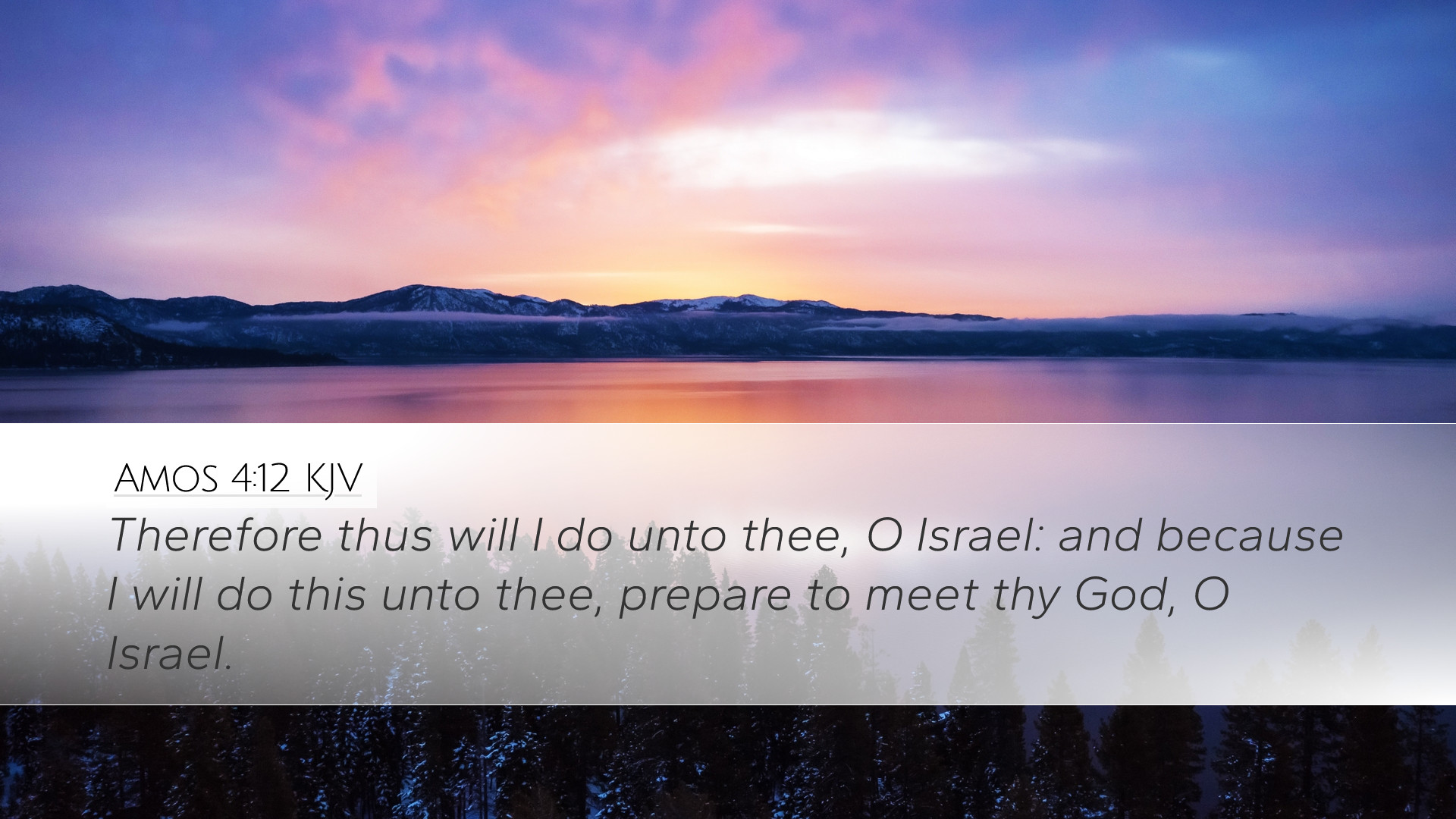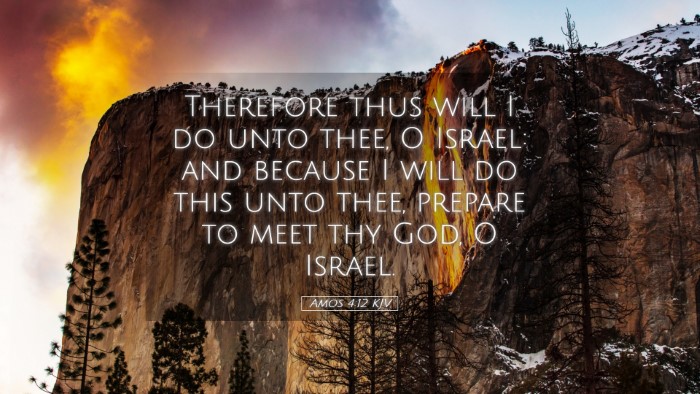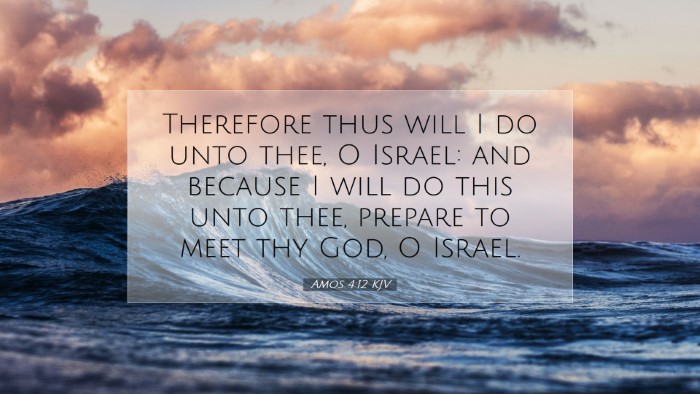Old Testament
Genesis Exodus Leviticus Numbers Deuteronomy Joshua Judges Ruth 1 Samuel 2 Samuel 1 Kings 2 Kings 1 Chronicles 2 Chronicles Ezra Nehemiah Esther Job Psalms Proverbs Ecclesiastes Song of Solomon Isaiah Jeremiah Lamentations Ezekiel Daniel Hosea Joel Amos Obadiah Jonah Micah Nahum Habakkuk Zephaniah Haggai Zechariah MalachiAmos 4:12
Amos 4:12 KJV
Therefore thus will I do unto thee, O Israel: and because I will do this unto thee, prepare to meet thy God, O Israel.
Amos 4:12 Bible Commentary
Amos 4:12 - A Call to Prepare to Meet God
“Therefore thus will I do unto thee, O Israel: and because I will do this unto thee, prepare to meet thy God, O Israel.”
Introduction
This verse, nestled within the prophetic utterances of Amos, serves as a grave warning and invitation. It encapsulates the urgency of divine judgment and the necessary preparation required to stand before God. Various public domain commentaries provide profound insights into its meaning and implications.
The Context of Amos
The book of Amos addresses the people of Israel during a time of prosperity but moral decay. As Israel enjoyed material blessings, the prophetic voice of Amos cut through complacency, calling for repentance. Amos 4:12 emerges as a climax in a series of warnings regarding the consequences of their unfaithfulness.
Commentary Insights
-
Matthew Henry's Insights
Matthew Henry emphasizes the personal and communal responsibility of Israel to recognize their standing before God. The phrase “prepare to meet thy God” is a call not just to individuals but to the nation as a whole. He notes that this preparation involves a deep introspection about one’s spiritual state, urging believers to reflect on their relationship with God.
Henry also highlights the dual nature of God's dealings—He is both a just judge and a loving creator. He asserts that the seriousness of sin demands preparation to face divine judgment while also allowing for the hope of redemption.
-
Albert Barnes' Reflections
Albert Barnes interprets this verse as a direct confrontation with the people of Israel. His commentary reflects on the phrase “I will do this unto thee,” indicating that God's actions are not arbitrary but are a conscious outcome of Israel’s disobedience. Barnes describes the importance of preparing for divine visitation, suggesting that it necessitates repentance, humility, and acknowledgment of one’s sins.
He also elucidates the nature of divine appointments, which require the faithful to be in readiness. The urgency of the statement points to the needed immediate response from the people, warning against the false security that comes from material prosperity.
-
Adam Clarke’s Perspective
Adam Clarke provides a broader context to Amos's exhortation. He echoes the importance of understanding the gravity of “meeting God” and warns that neglecting this call can lead to dire consequences. Clarke points out that the prophet's language conveys an expectation of accountability—those who are blessed are expected to live in obedience.
Clarke also notes that the “preparation” mentioned is not merely external but internal—a transformation of heart that aligns with God’s will. He stresses that genuine preparation manifests in changed behavior and sincere worship.
Theological Implications
The verse leads to significant theological reflections on the nature of God as both judge and redeemer. The imperative to “prepare to meet thy God” reveals the relational aspect of humanity's encounter with the divine. It urges theological scholars and students alike to ponder questions of sin, judgment, and repentance in the broader narrative of Scripture.
God’s Sovereignty and Justice
This verse affirms God's sovereignty over Israel and His righteous judgment. It illustrates the biblical principle that with blessing comes responsibility. Thus, the call to prepare signifies that God's justice will prevail, and humanity must stand accountable for their actions.
Repentance and Divine Mercy
Alongside judgment, the potential for mercy and restoration is evident. The call to prepare conveys hope; it is not merely a summons to face wrath but an invitation to repentance, which signifies the pathway back to divine grace.
Practical Application
For pastors, theologians, and students, Amos 4:12 serves as both a reminder and a challenge. The implications of this verse are far-reaching:
- Self-Examination: Individuals are encouraged to engage in regular self-assessment of their spiritual health and alignment with God’s standards.
- Community Awareness: Encourage congregations to understand their corporate responsibility in faithfulness to God. This fosters a culture of accountability and collective holiness.
- Preparation and Worship: Church practices must include teachings on the nature of God's holiness, encouraging preparations for worship that are both inwardly reflective and outwardly expressive.
- The Role of Prophetic Voices: The prophetic tradition remains crucial; leaders should not shy away from delivering hard truths akin to Amos—leading their flocks towards repentance.
Conclusion
Amos 4:12 brings forth an urgent and timeless call to the people of God. The exigency of preparation commands attention and transformation. Through insights drawn from Matthew Henry, Albert Barnes, and Adam Clarke, we gain a richer understanding of the verse’s depth and implications.
In our contemporary context, the challenge remains: are we prepared to meet our God? This question transcends time and speaks to the heart of faith, calling each one to a deeper relationship with the divine.


